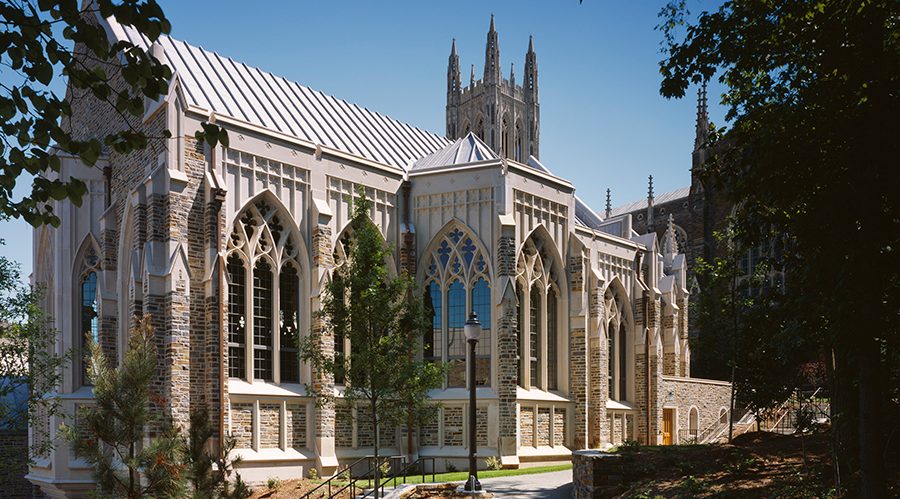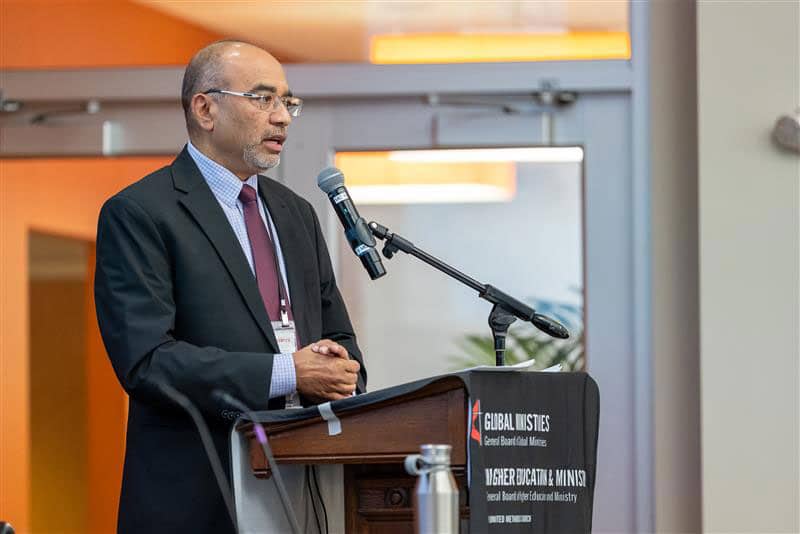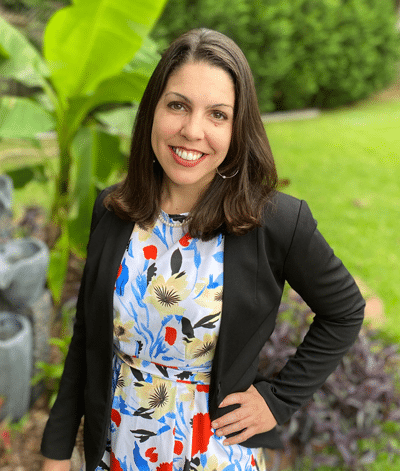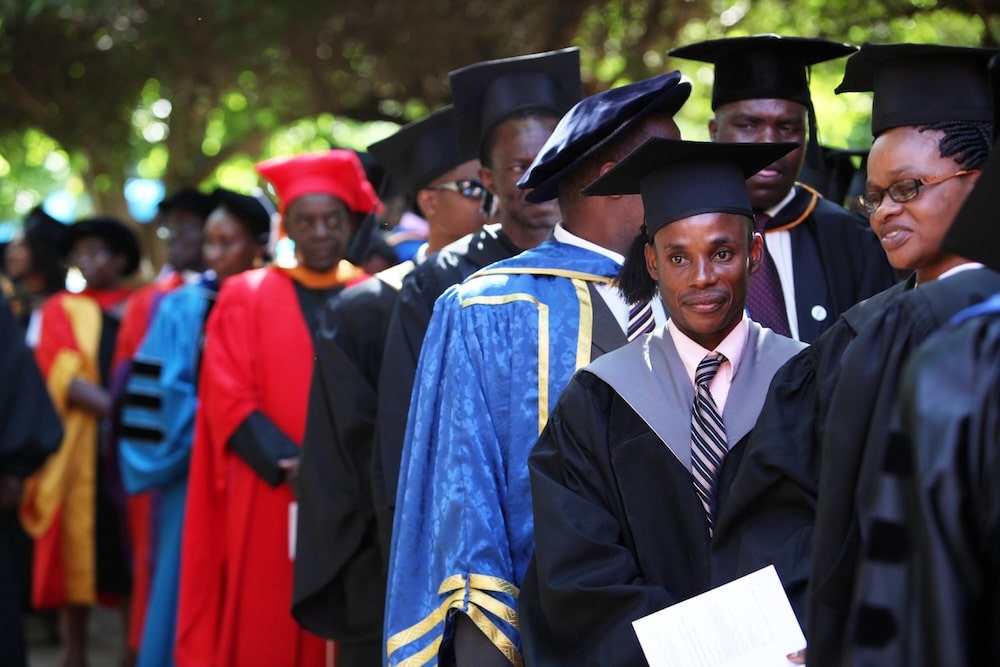Can the UMC Sustain 13 Seminaries? A New Study Investigates

Are 13 theological schools sustainable by the United Methodist Church (UMC)? A new, independent study found data for that question.
In his “Study of the Thirteen Official Theological Schools of The United Methodist Church,” Daniel O. Aleshire, former executive director of the Association of Theological Schools (ATS), identifies characteristics that set the UMC theological schools apart from those of other denominations. These include racial and ethnic diversity, higher percentage of enrollment in M.Div. and Ph.D. programs, less enrollment decline, and a pervasive United Methodist identity.
The Association of United Methodist Theological Schools (AUMTS) commissioned the independent study, which was completed in December 2018. The General Board of Higher Education and Ministry (GBHEM), The United Methodist Church’s leadership development agency, collaborates with AUMTS, whose membership consists of the 13 theological schools’ deans and presidents in the U.S.
“In a religiously plural world, and perhaps in a world that is religiously ‘nothing,’ this kind of education may be more advantageous than ever,” Aleshire says in the report. “The United Methodist schools share several common characteristics. Whatever else may be true of these schools, they are committed to the education of religious leaders, especially United Methodist leaders; they take seriously their role as bearers of the Wesleyan and United Methodist ethos; they attend seriously to issues of race and ethnicity; and they are self-consciously ecumenical in thought and practice.”
One telling factor is the ratio of seminaries to the number of members per denomination. The study found that the UMC has significantly fewer seminaries per capita than the of six other mainline denominations.
- UMC: One seminary per every 534,615 members
- Evangelical Lutheran Church in America: One seminary per every 437,500 members
- American Baptist Churches (USA): One seminary per every 217,000 members per seminary
- Episcopal Church, USA: One seminary per every 190,333 members per seminary
- Presbyterian Church (U.S.A.): One seminary per every 164,778 members
- United Church of Christ: One seminary per every 142,333
- Christian Church (Disciples of Christ): One seminary per every 124,250 members
By this comparative metric, one might argue that the UMC has too few seminaries, Aleshire says.
Enrollment trends from 2008 to 2017 for the 13 UMC schools show a slight increase in the earlier years of that time period. After a high point in 2011, however, enrollment began declining. Interestingly, the enrollment of white students has decreased while enrollment of people of color has held steady. Thus the enrollment decline represents a reduction in white students’ enrollment.
“The United Methodist schools are educating students now in the demographic reality that will be dominant in two decades,” Aleshire observes.
In general, the schools obtain about 90 percent of their revenue from tuition, long-term investments, grants and gifts from individuals and other organizations. Ministerial Education Fund (MEF) support constitutes less than 10 percent of total revenue for the 13 theological schools taken as a group. Yet for most schools, as Aleshire notes, “it is the difference between enough and not enough, between operating results that are balanced and results that are in deficit.”
Denominational funding also “has value beyond its absolute amount,” Aleshire says. “Its presence solidifies connections and its absence strains those connections and weakened connections could be the more difficult to overcome than reduced revenue.”
“The definitive factor is the combination of a theological fit of the schools with the theological commitments of the UMC and a centralized pattern of funding that, in effect, requires all United Methodists to participate in a portion of their funding,” Aleshire says. “To eliminate schools for the first reason is to redefine the church and to decentralize funding is to alter the connectional fabric of the denomination.”
The 13 theological schools also have a strong commitment to strengthening church leaders’ Methodist identity. “They have educated pastors and leaders for the church in a Wesleyan way,” Aleshire says.
Sustainability, Aleshire says, “will require the church to value the contribution of theological education, continuing to encourage knowledge as well as piety for its leaders; and it will also require the schools to ensure their own financial future.”
Read the full report here.
About GBHEM: As the leadership development agency of The United Methodist Church, the General Board of Higher Education and Ministry’s mission is to build capacity for United Methodist lay and clergy leaders to discover, claim and flourish in Christ’s calling in their lives, by creating connections and providing resources to aid in recruitment, education, professional development and spiritual formation. Every elder, deacon and licensed local pastor benefits from our training and candidacy programs. Many young adults find help in clarifying their vocation and God’s call in their lives through our leadership and discernment programs. Follow us on Twitter and Facebook: @GBHEM.
The UMC’s 13 theological schools in the U.S. are Boston University School of Theology, Candler School of Theology (at Emory University), Claremont School of Theology, Drew University Theological School, Duke Divinity School, Gammon Theological Seminary, Garrett-Evangelical Theological Seminary, Iliff School of Theology, Methodist Theological School in Ohio, Perkins School of Theology (at Southern Methodist University), Saint Paul School of Theology, United Theological Seminary (Ohio) and Wesley Theological Seminary.
Related Posts
Report of General Secretary Roland Fernandes to the Board of Directors of Global Ministries and Higher Education and MinistryApril 10, 2025 | By Elliott Wright ATLANTA – Directors of two of The United Methodist Church’s program agencies, both international in scope, were challenged by their shared leader to strengthen their work...
“I am so grateful and humbled. This scholarship helps me fulfill my dream of attending college, and I look forward to continuing to grow my faith within the Methodist Church throughout college and beyond.” — Matthew Mertes, The Ohio State University Matthew Mertes is...
Haley M. Reardon to Lead Fundraising Efforts for Higher Education and Ministry and Global Ministries
Haley Reardon, chief development officer Haley M. Reardon joins the General Board of Higher Education and Ministry and the General Board of Global Ministries as chief development officer on March 24, 2025. Reporting to General Secretary Roland Fernandes, Reardon will lead both agencies in advancing their global...








